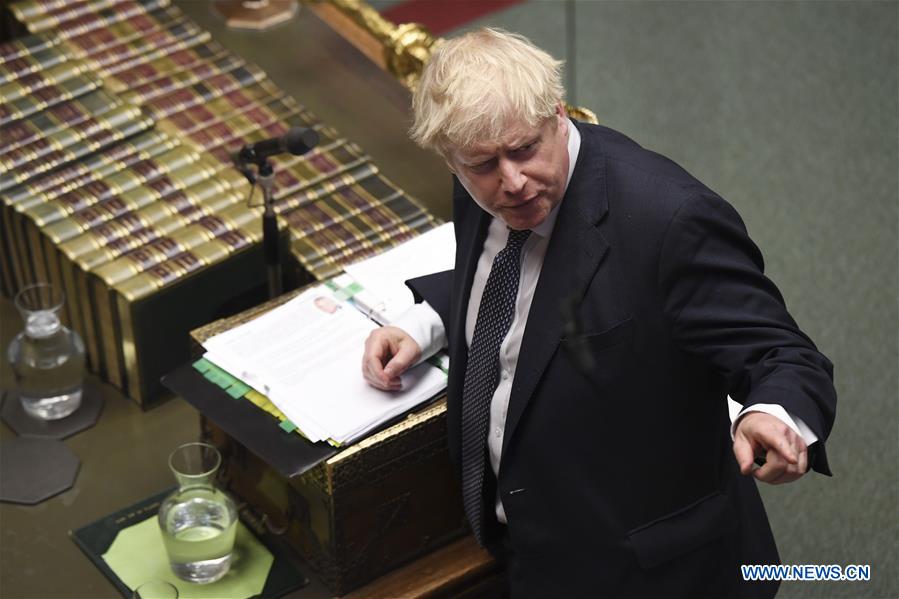Johnson stakes Brexit future on a general election
- By Heiko Khoo
 0 Comment(s)
0 Comment(s) Print
Print E-mail China.org.cn, October 25, 2019
E-mail China.org.cn, October 25, 2019

On Monday, Oct. 28, British Prime Minister Boris Johnson will ask parliament to agree to a general election on Dec. 12 in a bid to break the lengthy Brexit impasse. To succeed, this motion requires the support of the opposition Labor Party, which may not be immediately forthcoming.
After Johnson unexpectedly managed to secure last minute changes to Britain's withdrawal treaty from the EU on Oct. 17, he tried to force through legislation to leave with a Halloween departure date.
His Withdrawal Act bill – accepting the treaty in principle – was passed by parliament on Oct. 22 with a majority of 30, thanks to the support of 19 Labor MPs who broke party ranks.
However, Johnson's timetable to rush the Bill through parliament in three days was rejected, and he then suspended it, pending the EU's reply to parliament's request to delay Brexit until Jan. 31, 2020. Now he has proposed giving parliament more time to scrutinize the bill, provided it accepts an early election.
It was an alliance between the right wing of the ruling Conservative Party ["Tories"] and Northern Ireland's Democratic Unionist Party (DUP) that prevented Johnson's predecessor Theresa May from getting her deal through parliament on three occasions.
Now, the DUP, who oppose Johnson's deal, and 21 discontented "moderate" or "Remain" [in the EU] supporting Tory MPs, whose government "whip" has been removed, hold the balance of parliamentary power. Nonetheless, a vote on the Queen's speech, which outlined the government's legislative agenda, passed the House of Commons on Oct. 24.
Johnson is also under pressure from the Brexit party of Nigel Farage, whose campaign was the key to securing and winning the 2016 Brexit referendum. His newly-formed party demands "a clean break" departure from the EU on WTO terms, without a deal.
Their stance acts as a constraint on Johnson's identity within the political spectrum. For, if "Leave" voters feel betrayed by his deal, the Conservative Party will pay a heavy price in the polls. Already, in the European Parliament elections held last May, it suffered a massive defeat at the hands of the Brexit party – 30% of the vote compared to less than 9%.
Brexit party voters are predominantly composed of traditional Tory and Labor voters disgruntled at the impasse. It was the collapse of the Tory vote that precipitated Theresa May's resignation, and propelled Johnson to leadership by promising to force through Brexit come what may.
His performance has boosted the Tories by stealing the slogans, image, and identity of the Brexit Party. However, as Johnson's Brexit deal is subject to detailed scrutiny, this may revive the latter's fortunes at Tory expense. Farage has already denounced Johnson's deal as turning Britain into a semi-colony of the EU during the transition period lasting until December 2020.
On the other side of the Brexit debate, many Labor, Liberal and other opposition MPs fear a "no-deal Brexit" if a new free trade agreement is not signed off.
Johnson's performances and speeches have bolstered his image as a defender of the popular will against an intransigent and obstructive Remain-supporting parliament and judiciary.
If parliament agrees to a general election, scrutiny of the deal over the next weeks and any amendments moved, he can present this as part of a plot by opposition parties to scupper Brexit altogether by, for example, tagging a confirmatory referendum onto the legislation, or by voting for a customs union. Such amendments would require further EU negotiations and approval.
Johnson's key advisor, Dominic Cummings, is widely credited for his role as the mastermind behind the main Vote Leave campaign in the 2016 Brexit referendum. His focus is on simplicity of message, big data and social media, and he is an advocate of smashing conventional political niceties and replacing them by a single-minded will.
The mastery of media and advertising is often ascribed a decisive role in shaping political outcomes in this era of ubiquitous communication technologies and systems.
Cummings has advised Johnson to cast himself in the character of a rebel; one wrapped in the English flag, outshining the maverick Nigel Farage with public school self-assurance. Johnson is certainly a more flexible performer than Farage, comfortably playing several roles simultaneously.
However, if Farage so chooses, he can tailor the Brexit party's message to focus its main electoral campaign against Labor. If so, a de-facto pact, already requested by Farage, may be in the offing. Otherwise, the Brexit party will eat into the Tory vote in an election.
Labor leader Jeremy Corbyn also wants a general election but many of his MPs are opposed to this. Some hope for a second referendum before an election, in which the choice would be between Johnson's deal – subject to amendments agreed by both parliament and the EU – and remaining in the European bloc.
They assume that the electorate would vote to remain in the EU, and if not, they argue that people can make a fully informed decision based on the actual deal in front of them rather than the original Brexit abstraction of remain or leave.
Heiko Khoo is a columnist with China.org.cn. For more information please visit:
http://china.org.cn/opinion/heikokhoo.htm
Opinion articles reflect the views of their authors, not necessarily those of China.org.cn.
If you would like to contribute, please contact us at opinion@china.org.cn.






Go to Forum >>0 Comment(s)